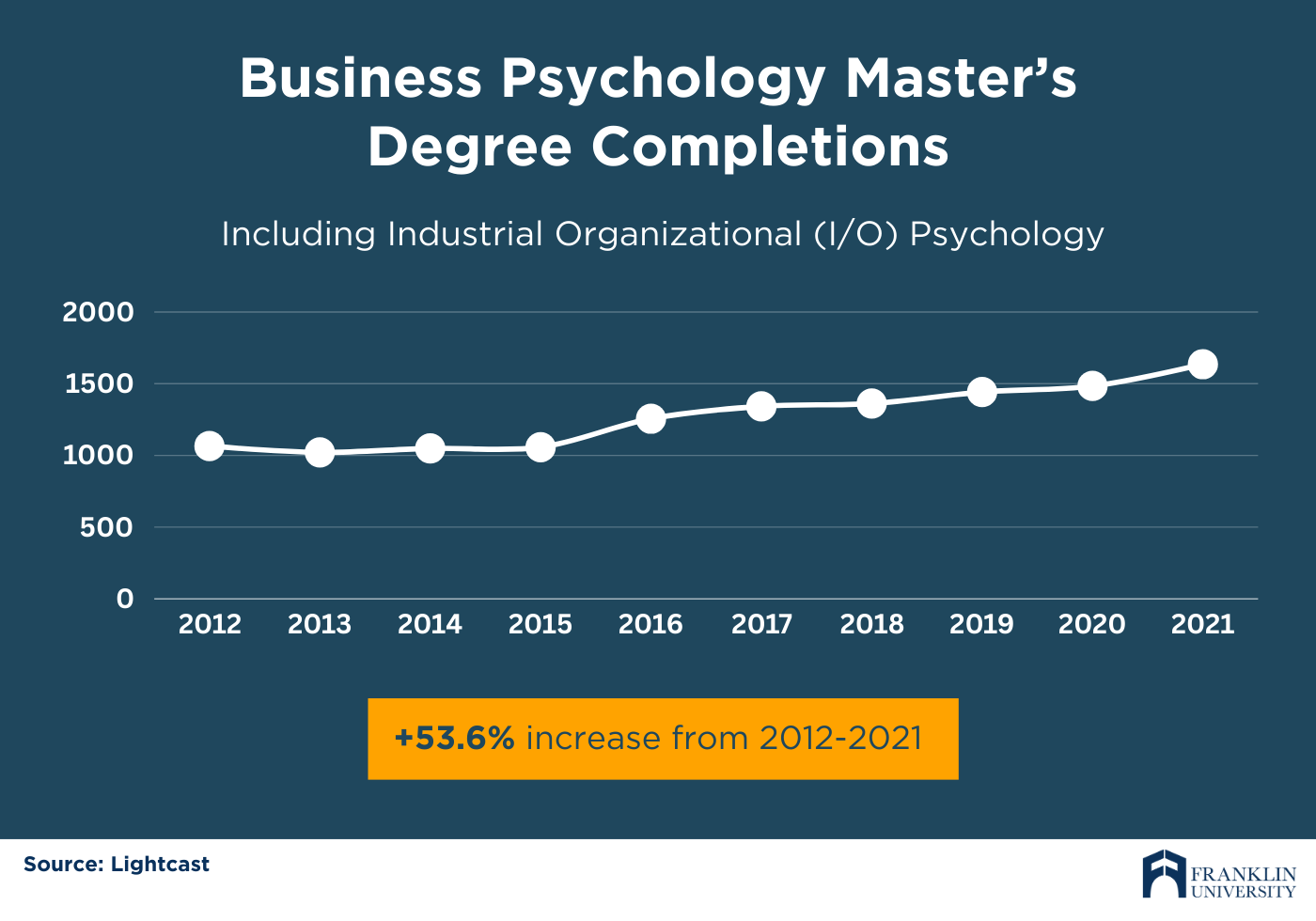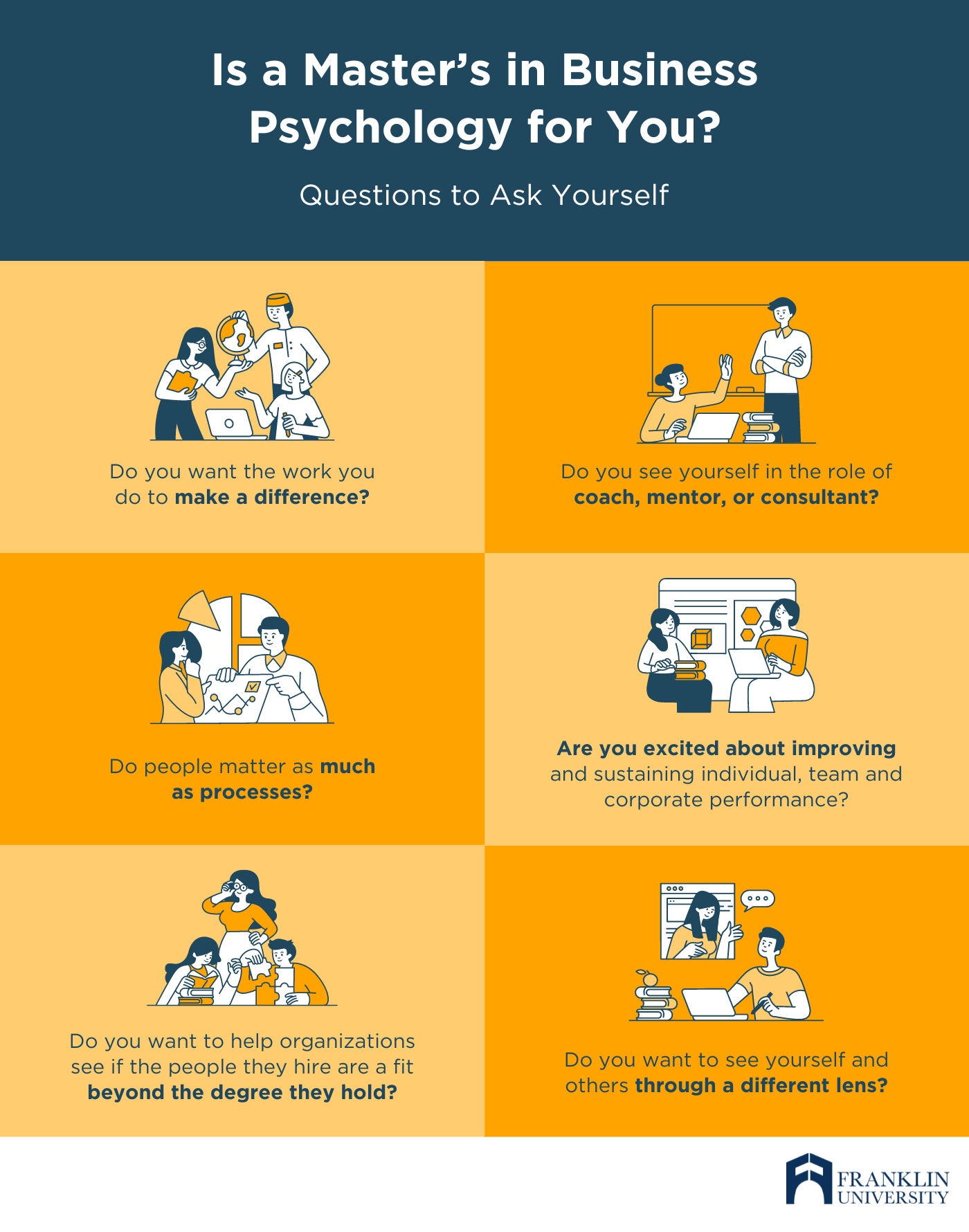Request Information
We're Sorry
There was an unexpected error with the form (your web browser was unable to retrieve some required data from our servers). This kind of error may occur if you have temporarily lost your internet connection. If you're able to verify that your internet connection is stable and the error persists, the Franklin University Help Desk is available to assist you at helpdesk@franklin.edu, 614.947.6682 (local), or 1.866.435.7006 (toll free).
Just a moment while we process your submission.

Is a Master’s In Business Psychology Worth It?
Business is business … or is it? The truth is, business is a very human enterprise despite the changes in the way people interact with one another combined with the rise in technologies, including artificial intelligence (AI).
But good business means more than creative goods and services. It means more than marketing those goods and services to the masses. And it means more than crunching the numbers.
Good business means understanding and relating to people, including working with and for others. And that means understanding human behavior within the context of business
What Is a Master’s in Business Psychology?
A master’s in business psychology takes traditional business courses, such as marketing, finance, economics and HR, and addresses them from both the traditional business perspective as well as the human one.
“The distinction between business psychology and industrial organizational (I/O) psychology,” says Jeffrey Ferezan, Ph.D, adjunct faculty and doctoral faculty advisor for Franklin University, “is that I/O is a ‘top down’ approach in which you learn how a business runs then trickle that down to the individual. With business psychology, it’s just the opposite. It’s a ‘bottom up’ approach based on individual strengths and weaknesses.”
Coursework is designed to help you enhance your understanding of human behavior so you can apply psychological principles to improve business and worker performance.

Many students choose a master’s in business psychology program because they’re better able to apply what they learn to the work they already do. Perhaps that’s also why the M.S. in Business Psychology is growing in popularity. According to labor market analytics firm Lightcast, master’s degree completions for business psychology, including I/O, increased 53.6% from 2012 to 2021.
Who Should Earn a Business Psychology Master’s?
A business psychology master’s degree could be right for you if you’re looking to play an influential role in helping your organization increase efficiency, boost productivity and improve employee satisfaction and well-being.
“This particular master’s degree program is for mission-driven people,” says Dr. Ferezan. “It’s for the forward-thinking, intentional person interested in career-relevant courses. It’s for the person who’s been in their career for 10 or 20 years and wants to do more. But don’t confuse it with a psychology degree that requires 600 hours of practicum work. This is for the person who wants to stay competitive, add value, and uncover the hidden value within their organization.”
Here are some questions to ask yourself that might indicate that a master’s in business psychology is worth it:

- Do you want the work you do to make a difference?
- Do you see yourself in the role of coach, mentor, or consultant?
- Do people matter as much as processes?
- Are you excited about improving and sustaining individual, team and corporate performance?
- Do you want to help organizations see if the people they hire are a fit beyond the degree they hold?
- Do you want to see yourself and others through a different lens?
The Role of Human Behavior in Business
Because business is a very human enterprise, those who can successfully combine business know-how with people skills are the ones who will lead organizations into the future. That’s where a master’s in business psychology comes in.
Business psychology can be used in every facet of business and across every industry to motivate behavior, resolve issues and leverage current neuroscience research to promote success.
Here are some of many the other ways a master’s in business psychology can bring positive change to business:
- Applied Innovation
- Change Management
- Creative Problem Solving
- Employee Engagement and Team Building
- Leadership Development
- Marketing Psychology
- Mentoring and Coaching
- Neuroscience and Human Development
- Organizational Alignment & Effectiveness
- Performance and Process Improvement
Occupations & Career Paths for Business Psychologists
When it comes to career paths, a business psychology degree can open you up to a wide variety of careers in the public, private and nonprofit sectors.
In addition, a master’s degree in business psychology also could open you up a variety of well-compensated occupations, which, according to labor market analytics firm Lightcast include:
1. Human Resources Managers
2. Marketing Managers
3. Industrial/Organizational Psychologists
4. Training and Development Managers
5. Managers, All Others
What matters most when choosing a master’s program? Compare features, benefits and cost to find the right school for you.
4 Top Jobs You Can Get with a Master’s in Business Psychology
If you’re wondering what you can do with a master’s degree in business psychology, the answer might surprise you. That’s because there are lots of options within the realm of business, ranging from consulting to HR to marketing.
Here’s a look at four career paths for business psychologists.
- Annual Median Salary: $126,230
- Job Outlook to 2031: 7% growth rate
- Role: Act as the liaison between management and employees
2. Management Analyst/Consultant
- Annual Median Salary: $93,000
- Job Outlook to 2031: 11% growth rate
- Role: Improve organizational efficiency
- Annual Median Salary: $133,380
- Job Outlook to 2031: 10% growth rate
- Role: Plan, develop and market new products and services
4. Training & Development Manager
- Annual Median Salary: $120,130
- Job Outlook to 2031: 7% growth rate
- Role: Enhance the skills and knowledge of the staff
Advance Your Career with a Master’s In Business Psychology
The demand for business psychologists who understand human behavior within the context of business is growing as businesses look for help in promoting employee well-being, enhancing worker performance, and advising top leaders.
So, if you’re looking for an exciting and rewarding career in a fast-growing field, this is it.
Prepare yourself to become a practicing business psychologist with a master’s in business psychology degree–and become the empathetic, holistic leader you were meant to be.





